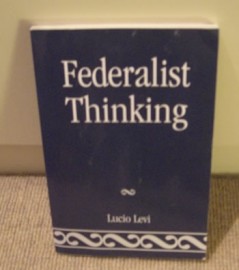
Lucio Levi, Federalist Thinking, Lanham, MD, University Press of America, 2008
Federalist Thinking is a concise and comprehensive account of the development of federalism from its starting point in history to present.
The book brings to light the federalist aspect, often forgotten, of the thought of authors representative of different disciplines and political tendencies. It points out unobserved relationships among classical thinkers belonging to distant, and generally unrelated, cultural areas such as political and constitutional thinking (the authors of The Federalist Papers and Kenneth Wheare), international relations (Lord Lothian and Emery Reves), philosophy (Immanuel Kant), law (Hans Kelsen), economics (Lionel Robbins and Luigi Einaudi), history (John R. Seeley and John Fiske) and different political tendencies such as liberalism (Lord Acton and Lionel Robbins), democracy (Alexis de Tocqueville), socialism (Claude-Henry Saint-Simon, Pierre-Joseph Proudhon and Barbara Wootton) and communism (Leon Trotskij and Michail Gorbachev). It also explores the recent trend of federalism to become an independent political behavior, represented by towering personalities, like Altiero Spinelli and Albert Einstein, who were among the founders of the European and world federalist movements.
This work is an attempt to achieve a synthesis among several intellectual contributions, in order to reassess the nature of federalism. The first outcome of this research is that the mere institutional notion of federalism, which is still predominant in the contemporary literature on the subject (from Kenneth Wheare to Ronald Watts) is highly reductive. Federal institution are only an aspect of federalism. To achieve a comprehensive definition of federalism, other aspects are worth considering.
According to the teaching of Mario Albertini, the book points out that there is a value aspect in federalism, i.e. peace, which enlightens the goal that federal institutions pursue. In other words, federal institutions should be regarded as the means to achieve peace. According the federalist standpoint, peace is not simply the absence of war (negative peace), which Kant called “truce” and placed in the same category as war. Positive peace requires a political organization which prevents war through entrusting the power to settle conflicts among states to a federal authority acting on the basis of law. According to Kant’s philosophy, the foundation-stone of peace is law and – more precisely – the extension of law to the sphere of international relations.
Moreover, the idea of federalism implies an historical aspect, which refers to the historical conditions to build peace through federal institutions. These conditions existed in the past in peripheral areas of the world, where the class conflicts and power politics exerted an irrelevant centralizing impact on state institutions (US, Switzerland, Canada, Australia). Today, the globalization process and the erosion of state sovereignty demand federal institutions to regulate international economy and civil society, to protect the global environment, to keep international terrorism and crime in check and to assure peace.
The process of European unification, which represents one of the most important political innovations of the 20th century, is the event which has attracted new interest in federalism. In fact, it is to be regarded as a means of solving the problem of the peaceful co-existence of a group of states through political unification in a way that reconciles political unity with a high degree of independence of member states.
The quasi-federal European institutions, which have assured peace for sixty years among nation-states, which have been divided by national hatred for centuries, represent a model for the other regions who aspire to build peace and for the whole world (UN reform) and to regulate international economic processes.
In Lucio Levi’s book particular attention is devoted to the contribution of contemporary Italian authors, especially Altiero Spinelli and Mario Albertini, whose works remain almost unknown out of Italy. And yet they gave an important contribution to federalist theory and to the understanding and promotion of European unification.
More information
